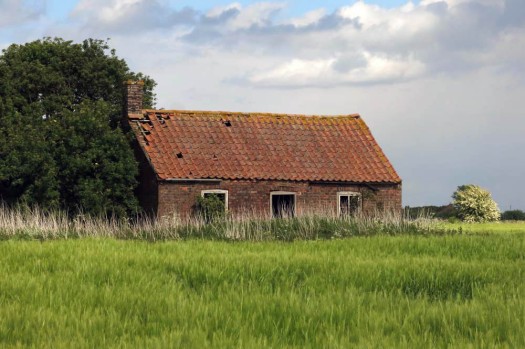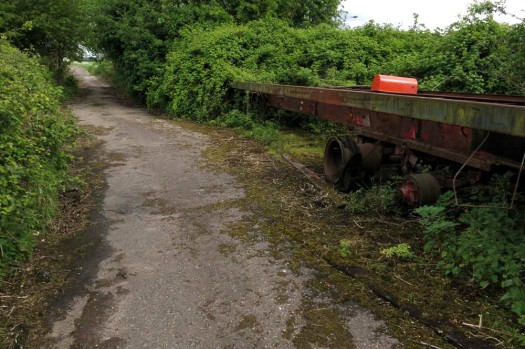 The far west of Norfolk between Terrington St John and Walsoken on the Cambridgeshire border is often referred to as Fen country but technically it is part of the Norfolk Marshland. John Seymour in his Companion Guide to East Anglia (1970) writes: “The Marshlands are not to be confused with the Fens. The Marshlands, nearer to the sea than the Fens, are of slightly higher land, not so subject to flooding, and have been inhabited from the earliest times”.
The far west of Norfolk between Terrington St John and Walsoken on the Cambridgeshire border is often referred to as Fen country but technically it is part of the Norfolk Marshland. John Seymour in his Companion Guide to East Anglia (1970) writes: “The Marshlands are not to be confused with the Fens. The Marshlands, nearer to the sea than the Fens, are of slightly higher land, not so subject to flooding, and have been inhabited from the earliest times”.  Like the Fens proper this is a region of wide horizons and big skies, a table-flat landscape of barley and mustard fields, of plantations of poplars and lonely farmsteads, of electricity pylons that march across the landscape like robotic sentinels. This is the countryside of The Goob, of Eastern European farm labourers and itinerant travelling folk. This is Tony Martin territory, where the stark cereal prairies of west Norfolk give way to the reclaimed farmland of the Cambridgeshire Fens. No airs or graces, no romantic rural idyll, this is countryside without finesse, without apology.
Like the Fens proper this is a region of wide horizons and big skies, a table-flat landscape of barley and mustard fields, of plantations of poplars and lonely farmsteads, of electricity pylons that march across the landscape like robotic sentinels. This is the countryside of The Goob, of Eastern European farm labourers and itinerant travelling folk. This is Tony Martin territory, where the stark cereal prairies of west Norfolk give way to the reclaimed farmland of the Cambridgeshire Fens. No airs or graces, no romantic rural idyll, this is countryside without finesse, without apology.  This region, along with the Fens to the west, is a Brexit stronghold where many bear a grudge towards the Eastern Europeans who come to work in the fields here. Antipathy to itinerant farm labourers is nothing new and Emneth, a village located hard against the Cambridgeshire border, has become particularly, and probably unfairly, infamous thanks to its Tony Martin connection. Interestingly, John Seymour, writing in the late 1960s, describes Emneth as having “one of the pubs in the Wisbech fruit-growing district that does not display the racialist (and illegal) sign: NO VAN DWELLERS, and consequently it is one of the pubs in which a good time may often be had”. They still grow fruit in the Wisbech district but I cannot vouch for the welcome currently proffered by its pubs.
This region, along with the Fens to the west, is a Brexit stronghold where many bear a grudge towards the Eastern Europeans who come to work in the fields here. Antipathy to itinerant farm labourers is nothing new and Emneth, a village located hard against the Cambridgeshire border, has become particularly, and probably unfairly, infamous thanks to its Tony Martin connection. Interestingly, John Seymour, writing in the late 1960s, describes Emneth as having “one of the pubs in the Wisbech fruit-growing district that does not display the racialist (and illegal) sign: NO VAN DWELLERS, and consequently it is one of the pubs in which a good time may often be had”. They still grow fruit in the Wisbech district but I cannot vouch for the welcome currently proffered by its pubs. 








Hidden places, secret histories and unsung geography from the east of England and beyond
Hello Laurence,
Among other things (including the photos, which I thought really brought out the theme of the piece) I was struck by your evocative description of a land, a place “without finesse, without apology”. Sadly, it feels as if this could describe so much of Britain at the moment.
All the best
Alan
Many thanks, Alan. Although you are right that this might describe many other parts of Britain at the moment I do feel that Marshland and Fens have a certain sort of man-made bleakness about them that you do not find so prevalent elsewhere. What I find most objectionable is the way that parts of the countryside have been given a sort of theme park treatment that isolates little pockets of wildness (which is never truly wild) between vast tracts of identikit Britain.At least Marshland has a distinctive ‘sense of place’ even if it would never win a beauty contest.
This is where I live and I love every bit of it…..why because we get no tourists and you can drive in our beautiful fens for miles and not see another car. Plenty of wildlife, peace, beautiful views and wonderful churches 🙂
Many thanks, Lynne.
Nicely in tune with current events and also with a longer history. Thanks Laurence!
Thank you, Paul.
Excellent piece that conveys the character and atmosphere of place, beyond the idea of a rural idyll. It made me think of Jerusalem (the play). We are living in interesting times where ideas of England and Englishness are changing, for better or for worse. I know what you are saying about identikit Britain but that is a complicated rant that could fill an entire book let alone a blog comment!
Thank you so much, Alex. You are right in saying England and the notion of Englishness is changing.. but I don’t think any of us quite no where it will end. Identikit Britain is, as you say, a rant that could fill a book. Indeed, I am currently working on a book/travelogue/memoir/psychogeographical field trip write-up that has this as one of its threads. The thing is, beneath the familiar the ‘particular’ still remains, the geography and accretion of history that makes up the patina of ‘place’.
Excellent – look forward to that! You might be interested in Crabman and his undermining of the National Trust landscape if you have not across this before. http://www.countertourism.net/reviews.html